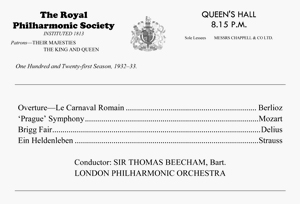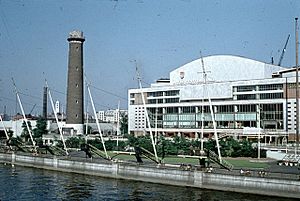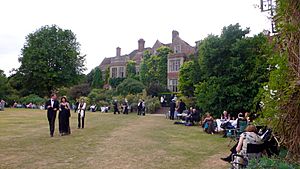London Philharmonic Orchestra facts for kids
Quick facts for kids London Philharmonic Orchestra |
|
|---|---|
| Orchestra | |
| Short name | LPO |
| Founded | 1932 |
| Location | London, England |
| Concert hall | Royal Festival Hall |
| Principal conductor | Edward Gardner |
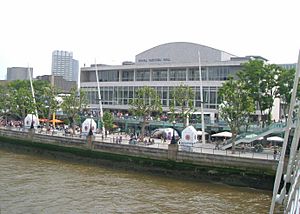
The London Philharmonic Orchestra (LPO) is a famous British orchestra based in London. It is one of the main symphony orchestras in London. The LPO was started in 1932 by two conductors, Sir Thomas Beecham and Malcolm Sargent. They wanted to create an orchestra that was as good as any in Europe or America.
Before World War II, many people thought the LPO was one of the best orchestras. During the war, the orchestra became a group run by its own musicians. After the war, new orchestras like the Philharmonia and the Royal Philharmonic became very popular.
By the 1960s, the LPO was playing at a very high level again. In 1964, they started playing at the Glyndebourne Festival every summer. Since 1993, the Royal Festival Hall has been their main home in London. They share this home with the Philharmonia Orchestra since 1995. The LPO also performs in other places like Eastbourne and Brighton, and they travel around the world.
Since Sir Thomas Beecham, the LPO has had ten main conductors. These include famous names like Sir Adrian Boult, Bernard Haitink, Sir Georg Solti, Klaus Tennstedt, and Vladimir Jurowski. The orchestra has made many recordings since it began. They have recorded for big companies like EMI and Decca. Since 2005, the LPO has its own record label, releasing live recordings of their concerts. They have also played music for many movies, including Lawrence of Arabia (1962) and The Lord of the Rings movies (2001–03).
Contents
History of the LPO
How the Orchestra Started
In the 1920s, London had several orchestras, but none were as good as the best ones in other countries. When the Berlin Philharmonic Orchestra visited London in 1927, people were amazed by their precise playing. This made many people want London to have its own top-level orchestra.
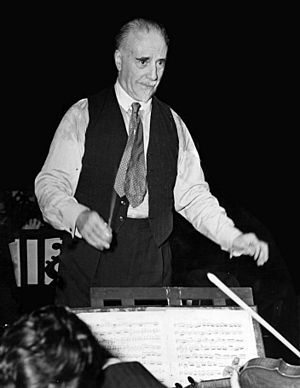
Sir Thomas Beecham, a famous conductor, wanted to create such an orchestra. He first talked with the BBC, but they couldn't agree on how it would be run. So, the BBC started its own orchestra, the BBC Symphony Orchestra, in 1930.
In 1931, another young conductor, Malcolm Sargent, suggested to Beecham that they start a new orchestra. Sargent's family would help pay for it. They decided to create a brand new orchestra from scratch. Many people wondered if they could find enough good musicians, as the BBC had already hired many. However, Beecham was very popular with musicians, and the tough economy meant many were looking for steady work. This helped them find excellent players.
Beecham and Sargent got money from important business people. They also got good deals to record music for Columbia and play for various concert series and opera shows. They named the new group the "London Philharmonic Orchestra." They hired 106 musicians, including some young talents and experienced players from other orchestras.
First Performances
After twelve practice sessions, the LPO played its first concert on 7 October 1932. Beecham conducted. The audience loved it, cheering loudly after the first piece. Critics praised the orchestra, saying it sounded "electrifying" and was "as fine an instrument as could be wished for."
In its first year, the LPO played many concerts for different groups. Famous soloists like the singer Eva Turner and the pianists Harriet Cohen and Clifford Curzon performed with them. The young violinist Yehudi Menuhin, only sixteen, played concertos with the orchestra, including one conducted by the composer Edward Elgar.
Over the next eight years, the LPO played many concerts in London and made over 300 recordings. Beecham conducted most of these. They also had guest conductors like Bruno Walter and Igor Stravinsky. The orchestra regularly toured cities and towns across Britain. Reviewers praised their playing, calling it "nobility of style and brilliancy of execution."
In 1936, Beecham took the orchestra on a tour of Germany. This tour was a bit controversial because of the political situation there at the time.
During and After the War
When World War II started in 1939, the LPO's financial supporters pulled out. Beecham helped the musicians form their own self-governing group. This meant the players themselves would run the orchestra.
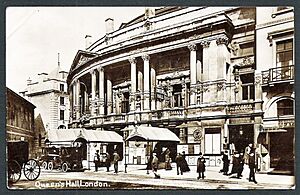
During the war, the LPO continued to play in London and toured Britain. They brought orchestral music to many places that rarely had it. In May 1941, the Queen's Hall was bombed, and many of the orchestra's instruments were lost. The BBC asked the public for help, and people donated instruments, allowing the LPO to keep playing.
When Beecham returned to England in 1944, the LPO welcomed him. However, the orchestra's players, now in charge, didn't want him to have complete control as before. Beecham didn't want to be an employee, so he left the LPO. In 1946, he started a new rival orchestra, the Royal Philharmonic Orchestra (RPO).
After the war, famous conductors like Walter and Furtwängler made guest appearances. The LPO played an amazing number of concerts. In 1947, Eduard van Beinum became their new main conductor. The London Philharmonic Choir was also started in 1947 to sing with the orchestra.
The 1950s and Beyond
In 1950, Sir Adrian Boult became the LPO's principal conductor. They started making many recordings together, which critics liked. In 1951, Boult and the LPO went on a demanding tour of Germany.
In 1952, the LPO signed a great recording deal with Decca Records. This helped the orchestra financially. In the same year, the orchestra faced a challenge when its managing director, Thomas Russell, was dismissed. This was partly due to concerns about the orchestra's finances.
In 1953, the LPO celebrated its 21st birthday with special concerts. In 1956, the LPO became the first British orchestra to tour the Soviet Union. After this tour, Boult stepped down as principal conductor but remained closely involved with the orchestra.
The late 1950s were tough financially for the LPO. They had to change how they paid their musicians. However, an unknown helper, thought to be Boult, helped them avoid disaster. In 1958, William Steinberg became chief conductor and helped improve the orchestra's playing.
The 1960s and 1970s
In 1962, the LPO went on its first tour to India, Australia, and the Far East. John Pritchard became the LPO's chief conductor that year. In 1963, the orchestra changed its rule about only having male musicians, and the first female violinist joined.
In 1964, the LPO became the main orchestra for the Glyndebourne Festival Opera. This gave the musicians steady work during the summer. The orchestra also held special concerts with guest stars like Danny Kaye and Duke Ellington to raise money.
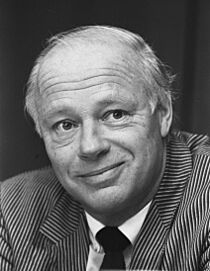
In 1967, Bernard Haitink became the LPO's principal conductor, staying for twelve years. Under him, the orchestra's concerts became very popular, often filling the Royal Festival Hall. Haitink was known for conducting music by composers like Bruckner and Mahler. The LPO also toured internationally, including a visit to China in 1972, where they were warmly welcomed.
In 1973, the LPO and the New Philharmonia Orchestra were asked to consider merging, but the musicians rejected the idea. Also in 1973, the LPO and the London Symphony Orchestra (LSO) bought an old church in Southwark. They turned it into the Henry Wood Hall, which opened in 1975. It became a great place for rehearsals and recordings.
When Haitink announced he would leave in 1977, Sir Georg Solti agreed to take over as principal conductor.
The 1980s and 1990s
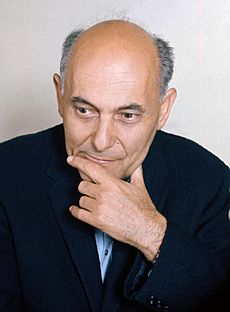
In 1982, the orchestra celebrated its 50th birthday. Solti conducted the same program that Beecham had used for the LPO's very first concert. Critics said the orchestra played beautifully.
Solti stepped down in 1983, and Klaus Tennstedt became the new chief conductor. Tennstedt was loved by the musicians, and his concerts were musically amazing, even though he often had to cancel due to poor health. He made many recordings with the LPO, including all of Mahler's symphonies.
In the mid-1980s, the LPO and the Philharmonia discussed sharing the residency at the Festival Hall. This plan was finally put into action in 1995. In 1985, the LPO hired its first chief executive from outside the orchestra's musicians.
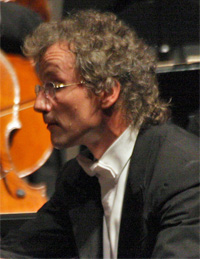
Tennstedt resigned in 1987 due to his health, but he continued to perform as a guest conductor. In 1990, Franz Welser-Möst became the new principal conductor. His time was a bit difficult, with some critics giving harsh reviews. The orchestra's high standards were not always kept up.
During Welser-Möst's time, the LPO became the only resident orchestra at the Festival Hall for a while. However, the venue management sometimes insisted on including less popular music, which hurt ticket sales. In 1993, the orchestra toured South Africa as the country was moving towards a new government. Welser-Möst left the LPO in 1996.
The 21st Century
After Welser-Möst left, the LPO didn't have a main conductor for four years. During this time, they started a program called "Roots Classical Fusions," which mixed music from different cultures. This was part of their education and community work.
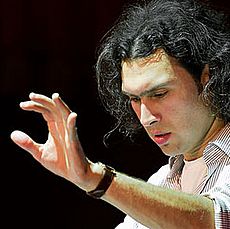
Kurt Masur was the LPO's principal conductor from 2000 to 2007. He helped the orchestra play even better. In 2000, the LPO performed Beethoven's Ninth Symphony in Krakow, Poland, which was broadcast internationally.
Vladimir Jurowski first conducted the LPO in 2001. He became the principal guest conductor in 2003 and then the LPO's eleventh principal conductor in September 2007. Like some conductors before him, Jurowski also led the Glyndebourne Festival Opera. He conducted the LPO in many operas there. Jurowski finished his time as principal conductor at the end of the 2020-2021 season and is now an honorary conductor.
Edward Gardner first conducted the LPO in 2003. In July 2019, the LPO announced that Gardner would be their next principal conductor, starting in the 2021-2022 season. His contract was extended in September 2024. In April 2020, Karina Canellakis was named the LPO's new principal guest conductor, making her the first female conductor to hold that position. Her contract was extended in February 2024.
Recordings
In its early days, the LPO recorded only for Columbia. Their very first recording was made even before their first concert in 1932. Beecham made many recordings with the orchestra. Other famous conductors like Elgar and Felix Weingartner also recorded with them. Soloists like pianists Artur Schnabel and Alfred Cortot recorded concertos.
After the war, the orchestra started recording for Decca, a rival company. They recorded many pieces with conductors like Ernest Ansermet and Erich Kleiber. The LPO made its first stereo recording in 1956.
Unlike some other London orchestras, the LPO recorded for many different companies over the years, not just one. Sometimes, they even used a different name, "the Philharmonic Promenade Orchestra," for some recordings. They also recorded a lot of British music for a company called Lyrita, often with Sir Adrian Boult.
The LPO has played on many opera recordings, both live and in studios. These include operas from different time periods, from older works like Cavalli's L'Ormindo to newer ones like Eötvös's Love and Other Demons.
By the early 2000s, there were fewer studio recordings being made. So, in 2005, the LPO started its own CD label. They release recordings mostly from their live concerts. Some of their best-selling recordings include Mahler's Eighth Symphony with Tennstedt, and works by Rachmaninoff and Tchaikovsky with Jurowski.
Music for Movies and Other Recordings
The LPO has played music for many movies. They started in 1936 with Whom the Gods Love. They played for ten films during World War II. A major movie score they played was for Lawrence of Arabia in 1962. Later, they played for movies like Antony and Cleopatra (1972), Jesus Christ Superstar (1973), Disney's Tron (1982), The Fly (1986), Dead Ringers (1988), In the Name of the Father (1993), and the entire Lord of the Rings trilogy (2001–03). They also played music for most of The Hobbit movies (2012–14). In 2013, the LPO recorded rock songs by Japanese musician Yoshiki for his album Yoshiki Classical.
The orchestra has also made many recordings that are not classical music. These include albums like Hawaiian Paradise (1959), Evita (1976), Broadway Gold (1978), and The Symphonic Music of Pink Floyd (1994). In May 2011, the LPO recorded the 205 national anthems that were used for medal ceremonies at the Olympic and Paralympic Games in London the following year.
See also
 In Spanish: Orquesta Filarmónica de Londres para niños
In Spanish: Orquesta Filarmónica de Londres para niños
 | William L. Dawson |
 | W. E. B. Du Bois |
 | Harry Belafonte |


